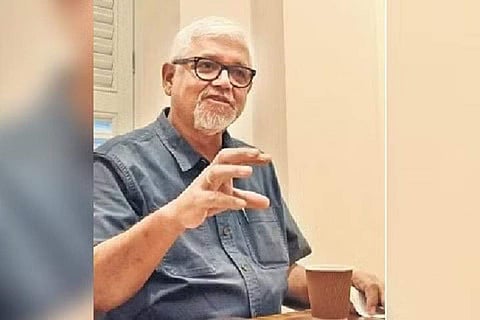
- LIFESTYLE
- FASHION
- FOOD
- ENTERTAINMENT
- EVENTS
- CULTURE
- VIDEOS
- WEB STORIES
- GALLERIES
- GADGETS
- CAR & BIKE
- SOCIETY
- TRAVEL
- NORTH EAST
- INDULGE CONNECT

Over the past two decades, one of the subjects that has managed to grip author Amitav Ghosh’s psyche on almost jacked-up levels has been opium. But not as a consumer, as an academic. He has been on a scholarly voyage to understand the opium trade and the Opium Wars of the 19th century and to look at this wildly popular drug as an agent of history. And thus far, the journey has been depressing.
“I have been researching the topic for 18 years now, and the material on the subject is depressing. On the one side, there are all kinds of lies being put forward to justify what they were doing. At the same time, it’s hard to find any positive shine in this story because the real problem is that there is more opium circulating in the world today than ever before. That is particularly true in India,” shares Ghosh, who recently came out with his book Smoke and Ashes: A Writer’s Journey Through Opium’s Hidden Histories. The book, published by HarperCollins, was released on July 15.
In fact, even his previous works, historical fiction series, the Ibis trilogy (Sea of Poppies (2008), River of Smoke (2011) and Flood of Fire (2015)), heavily deals with the wars and the opium trade.
“The wars were obviously a major event for the Chinese. There are lots of museums about the Opium Wars in southern China. But in India, we have no recollection of the Wars, even though Indians were participants: half the soldiers who fought were Indians, the support staff comprised Indians, and also, a lot of the financing came from Indians. It is strange that Indians have no recollection of the Opium Wars,” says Ghosh.
India’s involvement, Ghosh believes, might be something our country has actively tried to forget. The Opium Wars happened in China, and Ghosh, in Smoke and Ashes, mentions how China’s influence in Indian culture has always remained muted, especially compared to the West’s impact, for example. “It’s strange that India and China share a 1,000-mile border, and yet, there’s little awareness of what lies across the border. In Guangzhou, there is always a little shrine under a big banyan tree, much like Kolkata. If you visit a shop in India, there’s a little shrine of the Goddess Lakshmi. There are obvious kinds of certain thoughts and civilisational similarities,” elaborates the first Indian author to have won the Jnanpith Award for work in English.
Ghosh is bitten by the travel bug. And hints of a journey, a voyage can always be found in his work. “We Bengalis love to travel (laughs). I suppose it has to do with the fact that when I was a child, we lived in various places. The sort of propensity to travel came from there,” shares Ghosh, who is presently based out of Brooklyn.
If given the opportunity, the 67-year-old author would love to write for other mediums. “I wrote a short book called Jungle Nama, which adapted the legend of Bonbibi. That was done in different mediums — in verse, adapted for performance and also in music. I would like to experiment more. I’ve never worked in films. It’s something I would have liked to do, but it’s probably too late for me to learn about films now,” concludes Ghosh with a laugh.